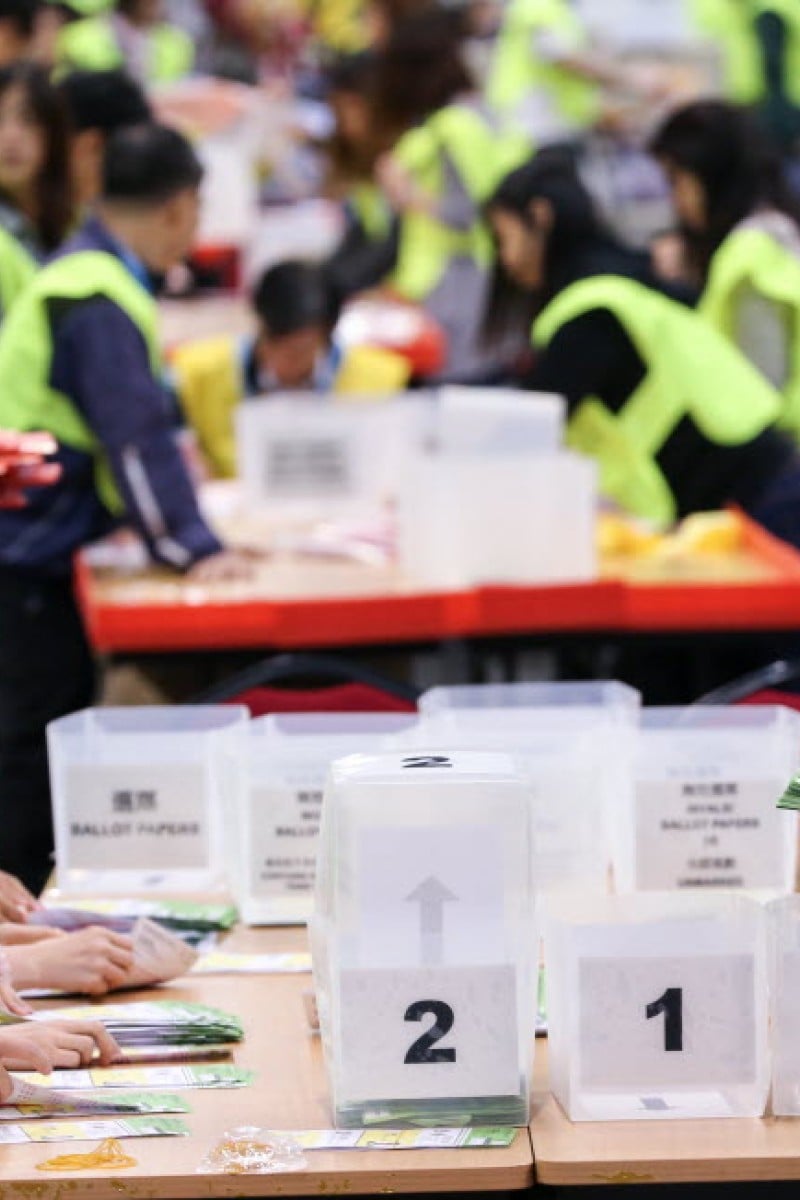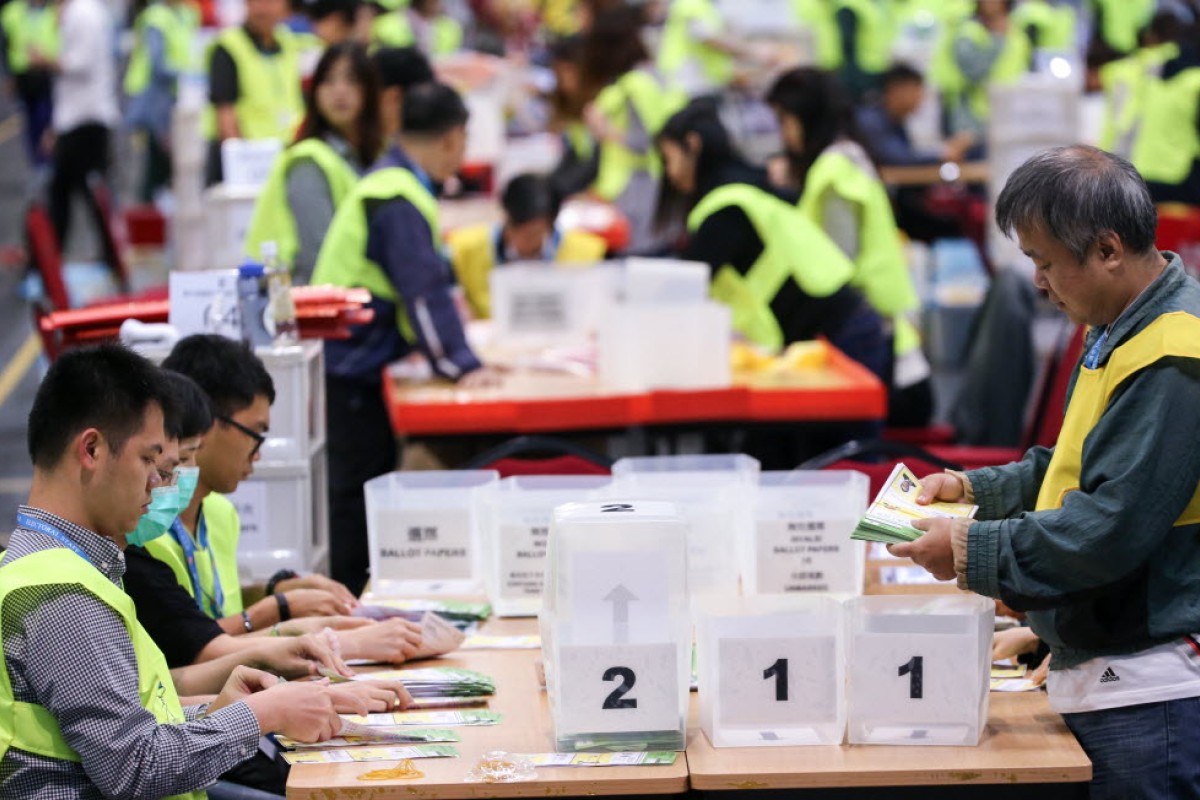
Shape of Hong Kong's political feature slowly comes into focus as election results continue to roll in
 Votes being counted at the 2016 Legislative Council General Election Central Counting Station at the AsiaWorld-Expo.
Votes being counted at the 2016 Legislative Council General Election Central Counting Station at the AsiaWorld-Expo. [UPDATE: Monday, September 5, 5.25pm]
A representative of New Territories East candidate, Baggio Leung Chung-hang of Youngspiration, reported an irregularity at Sheung Tak Community Hall counting station at around 4am on Monday.
Leung later said while about 6,000 ballot papers were handed out at the polling station, it ended up with about 6,300 votes in total. “Three hundred more votes suddenly appear in the counting station. It is not funny. It is more than 100 per cent turnout,” Leung said.
Electoral officers reportedly explained that there had been an error in the count earlier and that the original figures were crossed out and the correct number written out by hand. Their offer of a recount was rejected by Leung’s representative, who demanded the count be stopped pending a full investigation.
Electoral officer Peter Kwok Chung-kai, also Sai Kung assistant district officer, subsequently started the vote count at around 7am after seeking legal advice from the secretary for justice.
“The instruction we got from the Registration and Electoral Office is that the electoral work has to be finished as soon as possible. So we will continue the vote count,” Kwok said.
Secretary for Constitutional and Mainland Affairs Raymond Tam Chi-yuen said the Electoral Affairs Commission would explain the issue in detail when it submitted its report on the overall voting procedure.
The commission received more than 1,000 complaints about poll irregularities on Sunday.
[UPDATE: Monday, September 5, 2.33pm]
In the race for the six seats in the Kowloon West constituency, the DAB’s Ann Chiang Lai-wan topped the race with 52,541 votes. Other winners were Priscilla Leung Mei-fun of the Business Professional Alliance (49,745 votes), localist Lau Siu-lai (38,183 votes), the Civic Party’s Claudia Mo Man-ching (32,323 votes) and the Democratic Party’s Wong Pik-wan (26,037 votes).
Youngspiration’s Yau Wai-ching, who calls for Hong Kong’s self-determination, received 20,643 votes and defeated veteran radical lawmaker Wong Yuk-man for the sixth seat in Kowloon West.
The balance of power in Kowloon East remains unchanged, with the two pan-democratic parties keeping two seats and the pro-Beijing camp maintaining three seats.
The DAB’s Wilson Or Chong-sing led the race with 51,516 votes, followed by Democratic Party incumbent Wu Chi-wai with 50,309 votes. Pro-Beijing independent Paul Tse Wai-chun was re-elected with 47,627 votes.
The Federation of Trade Union’s incumbent Wong Kwok-kin came fourth with 47,318 votes.
The Civic Party’s Jeremy Tam Man-ho, with 45,408 votes, succeeded his party leader Alan Leong Kah-kit to fill the last seat.
About 2.2 million people voted in the five geographical constituencies, and the turnout was rated to be around 58 per cent – five percentage points higher than the last Legco elections four years ago. The rate also surpassed the 55.64 per cent of voters who came out for the 2004 Legco polls, which followed a protest of some 500,000 people on July 1, 2003, over proposed national security legislation.
Secretary for Constitutional and Mainland Affairs Raymond Tam Chi-yuen said he noticed several polling stations were still filled with people late Sunday evening. The last vote was cast at 2.30am on Monday at Hing On Mansion on Tai Yue Avenue in Taikoo Shing – four hours after the polls were scheduled to close.
Tam, who have witnessed several elections, said it was the first time he had seen the last vote being cast the morning after polling stations opened.
He said the congestion was in part due to space restrictions, which mean smaller areas being assigned for polling. Previous elections saw bigger voting areas being allocated throughout Hong Kong. The record turnout also intensified the congestion, he added.
“I sincerely offer my apologies to those who were affected,” he said. “I also appreciated the efforts of Taikoo Shing residents who were very patient and queued up in an orderly fashion.”
He said ballot tabulation was also delayed due to the longer-than-expected voting process.
“When a record-breaking 2.2 million people voting … queuing was inevitable,” he said.
[UPDATE: Monday, September 5, 2.08pm]
In the race for the nine seats in the New Territories West constituency, independent candidate Eddie Chu Hoi-dick has won with 84,121 votes.
The remaining eight seats were won by Michael Tien Puk-sun of the New People’s Party (70,646 votes), the DAB’s Chan Han Pan (58,673 votes), localist Civic Passion’s Cheng Chung-tai (54,496 votes), Leung Che-cheung of the DAB (50,190 votes), the Federation of Trade Unions’ Alice Mak Mei-kuen (49,680 votes), Civic Party’s Kwok Ka-ki (42,334 votes), Democratic Party vice-chairman Andrew Wan Siu-kin (41,704 votes), and pro-establishment solicitor Junius Ho Kwan-yiu, who grabbed the last seat with 35,657 votes.
[UPDATE: Monday, September 5, 1.50pm]
On Hong Kong Island, New People’s Party chairwoman Regina Ip Lau Suk-yee has won with 60,760 votes. She was followed by Nathan Law Kwun-chung of Demosisto, who bagged 50,818 votes.
The other four seats for Hong Kong Island were secured by Federation of Trade Unions’ Kwok Wai-keung (45,925 votes), Ted Hui Chi-fung of the Democratic Party (42,499 votes), DAB’s vice-chairman Horace Cheung Kwok-kwan (41,152 votes) and Tanya Chan from the Civic Party (35,404 votes).
High-profile businessman Ricky Wong Wai-kay, who secured 33,323 votes, was narrowly beaten by Chan.
[Monday, September 5, 11.53am]
Hong Kong’s pro-democracy camp looks set to retain veto power in the new legislature, as a host of new faces have pushed veteran lawmakers to the side.
The shift shows pro-democracy voters are prepared to establish a new political generation that focuses on achieving a more democratic future, rather than a radical pursuit of the city’s independence from China, pundits said on Monday morning as the first election results were announced.
However, the pro-Beijing camp will continue to dominate the legislature thanks to its heavy presence in the trade-based functional constituencies.
The election is the first to take place since the Occupy protests in 2014, and comes a little over six months before a new chief executive will be elected for Hong Kong.
Two moderate backers of self-determination won in their election debut. One is Occupy student leader Nathan Law Kwun-chung; the other is Polytechnic University lecturer Lau Siu-lai, who came in first among pro-democracy candidates in Hong Kong Island and Kowloon West respectively.
An unexpected victor was Eddie Chu Hoi-dick, who won more than 70,000 votes in New Territories West, a surprise result for a social activist with no party backup.
Veteran radical lawmaker Wong Yuk-man lost his seat in Kowloon West as he was defeated by Youngspiration’s Yau Wai-ching, who calls for Hong Kong’s self-determination. Together with Sixtus “Baggio” Leung Chung-hang, Youngspiration is likely to win two seats in the new Legco.
Further, the Labour Party lost two veteran lawmakers, Lee Cheuk-yan and Cyd Ho Sau-lan.
Frederick Fung Kin-kee, a super seat lawmaker, lost in the race in New Territories West.
“This is a grave challenge for traditional pan-democrats,” Professor Ma Ngok, a political scientist from Chinese University, said. “If the traditional parties fail to change their image, they will continue to face challenges from new faces.”
Dr Li Pang-kwong, of Lingnan University’s public governance programme, called it a change of climate.
“More democracy voters have changed to supporting localism,” Li said. “But at the same time the support for radicalism is waning.”
Radical lawmaker “Long Hair” Leung Kwok-hung, a keen fan of filibustering, is fighting a narrow battle with pro-establishment candidate Christine Fong Kwok-shan in New Territories East.
The Legislative Council election is likely to return at least 18 pro-democracy lawmakers out of the 35 geographical constituency seats, with all eyes on whether Tanya Chan of the Civic Party can fight off businessman Ricky Wong Wai-kay and take the last seat in Hong Kong Island.
Chan, once a top poll favourite, suffered from last-minute calls from Occupy organiser Benny Tai Yiu-ting for democracy supporters to vote strategically in favour of the underperformers in polls
On the pro-establishment front, most of the results matched pollsters’ predictions. Regina Ip Lau Suk-yee ran first in Hong Kong Island, as did Ann Chiang Lai-wan in Kowloon West.
Eunice Yung Hoi-yan helped New People’s Party, led by Ip, get a new seat in New Territories East.
The Labour Party’s Lee Cheuk-yan admitted defeat, saying his party was facing a crisis after he and Cyd Ho Sau-lan failed to retain their seats, leaving Fernando Cheung Chiu-hung as the sole representative in the legislature.
He used to focus on labour rights, while Ho and Cheung specialised in LGBT issues and the disability rights respectively.
“How could one person handle so many issues?” he said. “We need to figure a way out as losing seats would also mean a huge cut to our resources and community network.”
He said his defeat was caused by a series of factors, including the Thunder Go plan proposed by Occupy Central leader Benny Tai Yiu-ting, which advocated strategic voting.
“But most importantly, it is because the whole society wants to see change and new faces,” he said.
NeoDemocrats Gary Fan Kwok-wai, who claimed to be a pragmatic localist, also lost his seat. His party, which broke away from the Democratic Party a few years ago, would have no more representatives in the Legco.
Fan said he would resign from the party’s executive committee and would reflect on its election strategies.